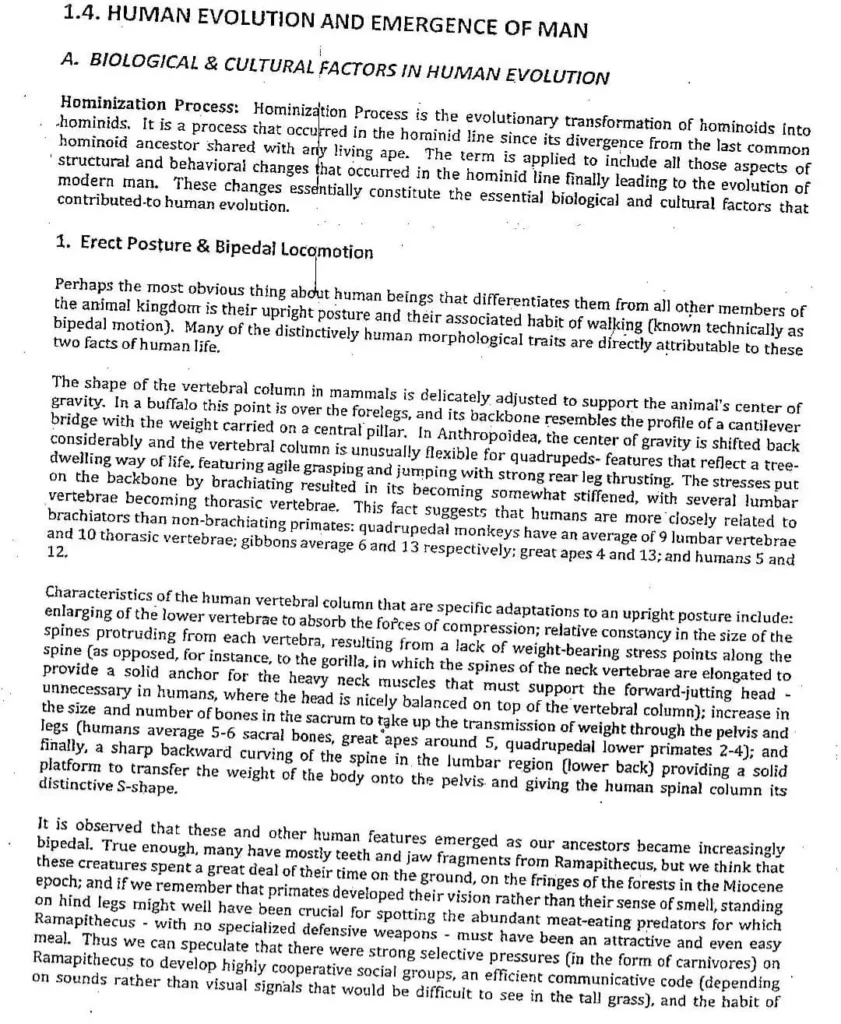Anthropology Notes For UPSC are study material that help you prepare for the anthropology optional subject for UPSC IAS Mains exam. The Anthropology Notes For UPSC PDF can be in the form of books, handwritten notes, online resources, coaching materials, etc. The notes help you understand the concepts, theories, and topics of anthropology, as well as provide you with examples, case studies, diagrams, and illustrations. The Anthropology optional notes can also help you practice writing answers and solving previous year questions of the optional subject.
Now Download anthropology notes for UPSC PDF. This package covers complete study materials for Anthropology UPSC optional. Anthropology is one of the best optional subject for UPSC civil services exam preparation among aspirants.
Get Vajiram Anthropology Optional Notes
Anthropology is the scientific study of human beings, their cultures, their societies, and their development. It is divided into two main branches: physical anthropology and social-cultural anthropology. Physical anthropology deals with the biological aspects of human evolution, variation, and adaptation. Social-cultural anthropology deals with the social and cultural aspects of human behavior, beliefs, and practices.
Anthropology Notes For UPSC PDF
Anthropology is a useful subject for UPSC exam because it covers topics that are related to general studies papers as well as current affairs. The Anthropology Notes For UPSC covers each and every topics of anthropology optional given in the UPSC syllabus.
For example, Anthropology Notes For UPSC can help you understand the diversity and unity of India, the issues of tribal and rural development, the impact of globalization and modernization, the role of culture and religion in society, the problems of gender and human rights, and the challenges of environmental and health issues.
Anthropology notes can also help you develop a holistic and comparative perspective, a critical and analytical thinking, and a humanistic and empathetic attitude.
Anthropology is an optional subject for UPSC IAS Mains exam, which means you can choose it as one of your two optional subjects.
The Anthropology Notes For UPSC PDF consists of two papers, paper 1 and paper 2, each carrying 250 marks.
Paper 1 covers the topics of physical anthropology and social-cultural anthropology, while paper 2 covers the topics of Indian anthropology and applied anthropology.
Subject Included in Anthropology Notes For UPSC
The Anthropology Notes For UPSC includes following subjects as given below:
Anthropology Notes For UPSC Paper 1:
The Anthropology Notes For UPSC Paper 1 consists following topics and subjects.
Part A: Physical Anthropology
- Meaning, scope and development of anthropology
- Relationship with other disciplines
- Main branches of anthropology
- Human evolution and emergence of man
- Characteristics of primates
- Theories of organic evolution
- Fossil evidence for human evolution
- The biological basis of life
- Genetic principles
- Human genetics
- Human growth and development
- Human adaptation
- Racial classification
- Concept of race
- Major races of the world
- Human variation
- Distribution of blood groups and genetic markers
- Dermatoglyphics
- Anthropometry and somatometry
Part B: Social-Cultural Anthropology
- Nature and scope of social-cultural anthropology
- Relationship with other social sciences
- Basic concepts of social-cultural anthropology
- Society, community, association, institution, group, status, role, norm, value, culture, etc.
- Social organization
- Marriage, family, kinship, descent, residence, etc.
- Economic organization
- Production, distribution, exchange, consumption, etc.
- Political organization
- Power, authority, legitimacy, law, etc.
- Religious organization
- Belief, ritual, symbol, myth, etc.
- Anthropological theories
- Evolutionism, diffusionism, functionalism, structuralism, culture and personality, cultural ecology, cultural materialism, symbolic and interpretive anthropology, postmodernism, etc.
- Research methods in anthropology
- Fieldwork, participant observation, interview, questionnaire, case study, genealogy, life history, etc.
- Tools and techniques of data collection
- Observation, interview, schedule, questionnaire, etc.
- Analysis, interpretation and presentation of data
- Statistical methods, diagrams, charts, graphs, etc.
Paper 2:
The Anthropology Notes For UPSC Paper 2 consists following topics and subjects.
Part A: Indian Anthropology
- Indian anthropology
- Scope and relevance
- Indian population
- Demographic profile
- Racial, linguistic and ethnic diversity
- Unity and diversity in Indian culture
- Indian society
- Social structure and social change
- Caste system and caste mobility
- Village, town and city
- Tribal situation in India
- Definition, identification and classification of tribes
- Geographical distribution of tribes
- Problems of tribal India
- Isolation, integration and assimilation
- Constitutional safeguards and welfare measures
- Tribal movements and unrest
- Tribal development and planning
- Role of anthropology in tribal and rural development
- Contributions of anthropology to the understanding of regionalism, communalism, secularism, ethnicity and nation-building
Part B: Applied Anthropology
- Applied anthropology
- Meaning, scope and historical development
- Role of anthropology in application
- Relevance of anthropology in contemporary world
- Anthropology and development
- Concept, approaches and strategies of development
- Anthropological perspective on development
- Development induced displacement and rehabilitation
- Sustainable development and participatory development
- Anthropology and health
- Concept of health and disease
- Health care system
- Indigenous and folk medicine
- Medical anthropology
- Epidemiology and public health
- Nutrition and malnutrition
- Anthropology and education
- Formal and non-formal education
- Education and social change
- Education and culture
- Anthropology and human rights
- Concept and origin of human rights
- Universalism and relativism of human rights
- Human rights issues in India
- Gender, child, dalit, tribal and minority rights
- Anthropology and environment
- Concept and types of environment
- Human-environment interaction
- Environmental degradation and conservation
- Environmental movements and activism
- Anthropology in designing of defence and other equipments
- Ergonomics and human engineering
- Anthropometry and its applications
- Design of clothing, footwear, furniture, etc.
IGNOU Anthropology Notes For UPSC
IGNOU anthropology notes for UPSC are study materials that are prepared by the Indira Gandhi National Open University (IGNOU) for the students who have chosen anthropology as their optional subject for the UPSC IAS Mains exam.
The anthropology notes for UPSC cover the topics of both paper 1 and paper 2 of the optional subject, and are based on the latest syllabus and trends of the exam.
IGNOU anthropology notes for UPSC are useful for understanding the concepts, theories, and methods of anthropology, as well as for revising and practicing the important points and questions of the subject.
IGNOU anthropology notes for UPSC are available in PDF format, and can be downloaded for free from various sources on the internet.
How IAS Aspirants can Get IGNOU Anthropology Notes For UPSC
Some of the sources of IGNOU anthropology notes for UPSC are:
#1- Testbook.com: This is a website that provides comprehensive anthropology notes for UPSC, as well as tips and strategies for writing answers and scoring high marks in the optional subject. The notes include IGNOU anthropology notes for UPSC, as well as notes from other sources, such as books, coaching materials, toppers’ notes, and online resources. The notes are updated and revised according to the latest syllabus and trends of the optional subject.
#2- XaamAdda.com: This is a website that provides IGNOU anthropology notes for UPSC, as well as other study materials, such as videos, articles, news, and MCQs. The notes are organized into different topics and subtopics, with links to relevant articles and videos. The notes are concise and easy to understand, and cover the basic concepts and theories of anthropology.
Anthropology Study Materials For UPSC Optional
Anthropology is a popular optional subject for UPSC IAS Mains exam, especially for those with engineering or science backgrounds. It covers topics related to human evolution, culture, society, genetics, and other aspects of anthropology. To practice from anthropology notes for UPSC, you can follow these steps:
#1- You need to have a clear understanding of the syllabus and the previous year question papers of anthropology optional.
#2- You need to select the best notes and study material for UPSC anthropology optional. Some of the recommended books are:
- An Introduction to Social Anthropology by D.N. Majumdar and T.N. Madan
- Physical Anthropology and Human Genetics by P. Nath and B.M. Das
- Anthropology Simplified by Vivek Bhasme
- Indian Anthropology by Nadeem Hasnain
- Tribal India by Nadeem Hasnain and R.K. Bhattacharya
#3- Aspirants need to make concise and comprehensive notes from Anthropology Notes For UPSC and other sources. You can also refer to the notes of some toppers who have scored well in anthropology optional, such as:
- Geetanjali Sharma (Rank 32, CSE 2023)
- Rahul Venkat (Rank 386, CSE 2015)
- Sachin Gupta (Rank 3, CSE 2017)
#4- You need to revise your Anthropology Notes For UPSC regularly and practice writing answers to the previous year and mock questions. You can also join a test series or a coaching institute to get feedback and guidance on your answer writing skills. You can also use online platforms like Testbook or Rega Academy to access free anthropology notes and test series.
#5- Students need to keep themselves updated with the current affairs and developments related to anthropology. You can read newspapers, magazines, journals, and websites that cover topics related to anthropology. You can also watch documentaries, videos, and podcasts that explain various concepts and issues of anthropology.
Anthropology Optional Notes for UPSC – Preparation Tips
Here are some of the preparation tips from Anthropology Optional Notes for UPSC:
#1- Anthropology is a popular optional subject for those with Engineering or Science backgrounds, as it has topics that overlap with General Studies papers in both Prelims and Mains.
#2- Aspirants should cover the entire syllabus of Anthropology Notes for UPSC optional paper 1 and paper 2, which includes topics like human evolution, biological basis of life, nature of culture and society, human genetics, marriage, family, kinship, religion, anthropological theories and research methods, etc.
#3- You should also study from IGNOU Anthropology notes, which are available online for free. These notes cover topics like comparative ethnography, methods of anthropological research, etc.
#4- UPSC aspirants should make mind maps or diagrams to revise the concepts and facts of Anthropology. You can also use the mind map given in the Anthropology Optional Notes for UPSC, which helps you in learning or revising Anthropology optional topics 10 times faster and better.
#5- You should practice writing answers to previous year questions and mock tests, and get feedback from experts or peers.
#6- You should also keep yourself updated with the current affairs related to Anthropology.
Advantage of choosing Anthropology as UPSC Optional
No Specialization Required
Anthropology is a subject which does not require specialization , just one needs some common sense to deal with the subject. Everyone with common sense , having average intelligence can deal with anthropology excellently and that is beauty of the subject.
Familiarity And Interesting
Subject matter is familiar and highly interesting, since one has to study sociological institutions like marriage , family , kinship , economical institutions , political institutions , religion etc. We are part of these institutions , every human beings as part of this society has been experiencing this institutions in once lifetime. one is going to study all these things in anthropology. Therefore , although you have not studied anthropology in your educational background in your lifetime , yet most part of the subject will be familiar to you.
Apart from these , we have to study caste system , varna system , reservation policy , social transformations , tribal people which are constituting around 8 % of the total population. So these are to be studied in anthropology optional. Therefore without studying this subject earlier , yet we know lot of things about the subject. So this familiarity makes things interesting. As a result one can easily cope up with the subject and grasp the subject effectively , in a short span of time.
Short Syllabus of Anthropology Optional
Next, the syllabus of anthropology optional is really a shorter one. Although it appears to be lengthier because each and every aspect to be studied has been elaborately given in the syllabus. Questions will come from the topics mentioned in the syllabus , which are not mentioned in the syllabus will not be asked.
For example, in the topics of marriage , UPSC has recommended to study – forms of marriage , definition of marriage , functions of marriage , dowry etc. So if you consider the institution of marriage there are many other things within this institution for example divorce , since it is not mentioned in the syllabus , it will not be asked in the exam.
Because of this elaborations of the topics, the syllabus appears to be lengthier. But actually it is a shorter syllabus. Because we are supposed to do those things mentioned in the syllabus only. Suppose the syllabus has not elaborated things , they have just write institution of marriage and written nothing else, then you have to study each and every aspect of marriage. So things would have been much broader. So do not evaluate the length of the subject.
Anthropology Syllabus Can Be Covered In Short Span Of Time
Moreover, the whole subject one can prepare in an exam oriented manner in a span of three months. After that he is ready for writing exam. Surely , one will be getting very good score. So think, if a subject can be learned in just 3 months, is it lengthier one?
Traditional And Static In Nature
The subject is traditional and static in nature. We have to study tribal societies which is traditional in nature. They are changing but they are very very slow to change. As a result most of the content of the syllabus is highly static. Therefore one should not be after current affairs , newspapers, magazines. Since collecting facts from day to day newspapers and magazines are time consuming. So if things are dynamics , it takes more hard work. One should be up to date then only one can score good marks. But in case of traditional subjects and static subjects like Anthropology , one has not to do all these things thus it can save your time. Moreover, it makes subject easier.
Straightforward Questions
The biggest advantage of the subject is straightforward questions. Questions are completely straightforward. They just pickup the topic and makes questions from it.
So what is the advantage of straightforward questions?
- See, if questions are straight forward , you know what can be the questions therefore you can prepare answers beforehand, you can revise them , you can write them , many times, before exams and go to exam hall and reproduce your answers directly. Therefore quality of answers will be highly enriched.
- You can have maximum speed of presentation. As a result you can write all the questions even within a context of time. This advantage is not available in other optional like public administration, sociology, geography. In these almost all the questions are highly twisted. If you cannot understand the demand of the questions , how can you frame your answers. That means you have to write extempore, in extempore writing ,one cannot write things in properly structured manner. That becomes very difficult to give flow to the answers and if one can not do all these thing , he will be given very less marks.
- But in anthropology because of straight forward questions you can prepare your answers before exam. Therefore , anthropology is very very scoring subject. It is the highest qualifying optional among social sciences therefore day after day its popularity is going high.
Anthropology Optional As A Subject Of Certainty
Anthropology is a subject of certainty also, if you work hard under reliable guidance, you are certain to score extra-ordinarily. There is no such kind of certainty in other optional.
Anthropology Optional : Benefit in General Studies and Essay
Apart from these there is another advantage of anthropology, that is anthropology has many benefits in GS and in essay as well. In GS it is relevant in cultural part, social issues, polity and governance, science and technology to some extent in ethics as well.
The Bottom Line
Therefore , anthropology as an optional is the best optional, it is not an isolated subject, it is helpful for GS , essay as well as interview. Therefore if one goes with anthropology in UPSC , there is maximum chances to score high in optional which is key to one’s success in UPSC exam. Even today, it is optional which determines your success. Anthropology as an optional has the maximum benefit for students.
Anthropology Notes For UPSC – FAQs
Anthropology is the study of human beings, their culture, society, biology, and evolution. Anthropology Optional Notes is important for UPSC because it helps in understanding the diversity and complexity of human societies, as well as the challenges and opportunities they face in the contemporary world. The notes also covers topics that overlap with other subjects in the UPSC syllabus, such as history, geography, sociology, economics, polity, ethics, and science and technology.
To download anthropology notes for UPSC pdf, you can follow these steps:
#1- Visit xaamadda.com that provide anthropology notes for UPSC pdf.
#2- Scroll down to find the links to download the anthropology notes for UPSC pdf for different topics and papers. You can also use the search bar to find the specific notes you are looking for.
#3- Click on the link to download the anthropology notes for UPSC pdf. You may need to enter your email address or register on the website to access the notes.
#4- Save the anthropology notes for UPSC pdf on your device and open them with a PDF reader. You can also print them if you prefer hard copies.
NCERT books are not enough for making anthropology notes for UPSC. NCERT books only provide a basic introduction to the subject and do not cover the entire syllabus of anthropology optional.
One should use NCERT books as a foundation and supplement them with other books and study materials that are more comprehensive, detailed, and updated.


